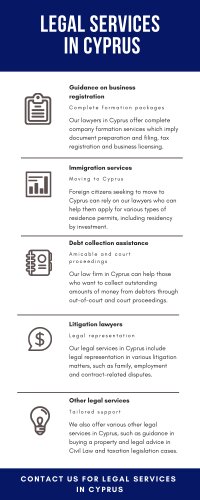Best Immigration Lawyers in Larnaca
Share your needs with us, get contacted by law firms.
Free. Takes 2 min.
List of the best lawyers in Larnaca, Cyprus
Cyprus Immigration Legal Articles
Browse our 1 legal article about Immigration in Cyprus written by expert lawyers.
- Why Securing Permanent Residency in Cyprus Might Be the Best Option for You and Your Family
- For many non-EU nationals, relocating to a country that offers safety, stability, and quality of life is a top priority. Cyprus has become one of the most attractive destinations for individuals and families seeking to build a secure future.Thousands of third-country nationals have already chosen Cyprus thanks to its high... Read more →
About Immigration Law in Larnaca, Cyprus
Larnaca, a beautiful coastal city in Cyprus, is not only known for its rich history and picturesque landscapes but also as a significant hub for immigration. The city attracts expatriates, asylum seekers, and students, making immigration laws an essential framework for its diverse population. The legal processes related to immigration in Larnaca involve obtaining residence permits, work permits, family reunifications, and compliance with regulations governing asylum applications. Navigating these legal frameworks can be complex, and understanding the basics is crucial for prospective immigrants.
Why You May Need a Lawyer
There are several situations where seeking legal advice can be beneficial for individuals dealing with immigration matters in Larnaca:
1. Visa Applications: Whether you are applying for a student visa, work visa, or family reunification visa, a lawyer can help ensure all paperwork is in order and improve your chances of approval.
2. Residence Permits: Navigating the application process for a temporary or permanent residence permit can be daunting. Legal professionals can provide clarity and assistance in this process.
3. Asylum Seekers: If you are seeking asylum, the process involves several stages of legal scrutiny and documentation. An experienced lawyer can be instrumental in presenting your case effectively.
4. Business Immigration: Entrepreneurs and investors moving to Larnaca need to comply with specific requirements for business visas and permits. Legal guidance can streamline this process.
5. Legal Disputes and Appeals: If your immigration application is denied, a lawyer can help you file an appeal and represent you in legal proceedings.
Local Laws Overview
Immigration laws in Larnaca, and Cyprus as a whole, are governed by several key pieces of legislation:
1. Aliens and Immigration Law: This law outlines the requirements for entry, stay, and exit of non-citizens in Cyprus. It includes provisions for various types of visas and residence permits.
2. Refugee Law: This legislation sets the framework for processing asylum applications and the rights and responsibilities of asylum seekers.
3. Employment Laws: These laws regulate the employment of non-Cypriots, including the issuance of work permits and adherence to labor regulations.
4. Citizenship Law: Governed by the Civil Registry Laws, this law details the requirements and process for acquiring Cypriot citizenship.
Frequently Asked Questions
1. What types of residence permits are available in Larnaca?
There are several types of residence permits, including temporary residence permits, permanent residence permits, and special categories for students, workers, and family members of residents.
2. How do I apply for a work visa in Larnaca?
Applications for work visas must be submitted through your employer, who must provide a valid job offer and meet specific criteria set by the Cypriot government.
3. Can I study in Larnaca with a student visa?
Yes, international students can apply for student visas, provided they have been accepted into a recognized educational institution in Cyprus.
4. What are the requirements for family reunification in Cyprus?
Family reunification visas require proof of a family relationship with a resident in Cyprus, adequate housing, and financial means to support the family members joining you.
5. How can I seek asylum in Larnaca?
Asylum seekers must apply through the Asylum Service, providing detailed reasons for seeking asylum and undergoing a thorough assessment process.
6. Is it possible to get Cypriot citizenship?
Yes, through naturalization, marriage to a Cypriot citizen, or other qualifying criteria, individuals can apply for Cypriot citizenship.
7. What happens if my visa application is denied?
If your visa application is denied, you have the right to appeal the decision with the help of a legal professional who can guide you through the appeal process.
8. Are there any specific immigration rules for EU citizens?
EU citizens enjoy certain freedoms under EU law, including the right to reside and work in Cyprus without the need for a visa.
9. Can I travel outside Cyprus with a residence permit?
Yes, residence permit holders can travel outside Cyprus but must ensure their permit remains valid and adhere to re-entry rules.
10. What are the common reasons for visa rejection?
Common reasons for visa rejection include incomplete applications, insufficient financial means, lack of proper documentation, and previous immigration violations.
Additional Resources
For additional help, consider the following resources:
1. Civil Registry and Migration Department: Handles all residence permits, visas, and nationality matters in Cyprus.
2. Asylum Service: Manages the application and processing of asylum seekers.
3. Local Legal Associations: Offer referrals and assistance in finding experienced immigration lawyers.
4. Embassies and Consulates: Provide support and information related to your home country’s regulations.
Next Steps
If you need legal assistance with immigration in Larnaca:
1. Consult a Lawyer: Find an experienced immigration lawyer who can provide personalized legal advice based on your situation.
2. Gather Documentation: Ensure you have all required documents organized and ready for submission.
3. Follow Legal Procedures: Adhere to the legal guidelines provided by your lawyer and the immigration authorities.
4. Stay Informed: Regularly check for updates on immigration laws and policies that may affect your status.
5. Be Patient: Immigration processes can be lengthy, so be prepared for potential delays and maintain regular communication with your legal advisor.
Lawzana helps you find the best lawyers and law firms in Larnaca through a curated and pre-screened list of qualified legal professionals. Our platform offers rankings and detailed profiles of attorneys and law firms, allowing you to compare based on practice areas, including Immigration, experience, and client feedback.
Each profile includes a description of the firm's areas of practice, client reviews, team members and partners, year of establishment, spoken languages, office locations, contact information, social media presence, and any published articles or resources. Most firms on our platform speak English and are experienced in both local and international legal matters.
Get a quote from top-rated law firms in Larnaca, Cyprus — quickly, securely, and without unnecessary hassle.
Disclaimer:
The information provided on this page is for general informational purposes only and does not constitute legal advice. While we strive to ensure the accuracy and relevance of the content, legal information may change over time, and interpretations of the law can vary. You should always consult with a qualified legal professional for advice specific to your situation.
We disclaim all liability for actions taken or not taken based on the content of this page. If you believe any information is incorrect or outdated, please contact us, and we will review and update it where appropriate.
Browse immigration law firms by service in Larnaca, Cyprus
Larnaca, Cyprus Attorneys in related practice areas.
















